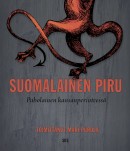Tag: folklore
Petri Pietiläinen: Koirien Suomi. Kansanperinnettä ja historiaa [Dogs in Finland. Folk tradition and history]
12 March 2015 | Mini reviews, Reviews
 Koirien Suomi. Kansanperinnettä ja historiaa
Koirien Suomi. Kansanperinnettä ja historiaa
[Dogs in Finland. Folk tradition and history]
Helsinki: Finnish Literature Society, 2014. 239 pp., ill.
ISBN 978-952-222-540-5
€32, hardback
Non-fiction writer Petri Pietilä is the author of the award-winning book Koirien maailmanhistoria (‘Dogs in world history’), which deals with the general cultural history of the dog. In the first half of this lively and fascinating new book he discusses the dog in Finnish folk tradition, while in the second half he gives an account of the history of the dog in Finland to the present day. Dogs have been domesticated in the North European region for thousands of years. In folk poetry, such as the national epic, the Kalevala, the dog is first and foremost a house guard and a partner in hunting. In Finnish folk tradition, the dog is viewed more leniently than in other countries, and stories about hellhounds are rare. Yet the attitude towards dogs in Finnish proverbs is not an exclusively positive one. Pietilä also says that the dog’s change of status has been linked to its becoming a helper and beloved pet, and today there are more than half a million of them in Finland. In addition, they are increasingly being used in various work and service roles. The book also presents the six Finnish dog breeds, and includes a dog name day calendar.
Translated by David McDuff
Suomalainen piru. Paholainen kansanperinteessä [The Finnish devil. The Evil One in Finnish folklore]
23 December 2011 | Mini reviews, Reviews
 Suomalainen piru. Paholainen kansanperinteessä
Suomalainen piru. Paholainen kansanperinteessä
[The Finnish devil. The Evil One in Finnish folklore]
Toim. [Ed. by] Mari Purola
Kuvitus: [Illustrations]: Christer Nuutinen
Helsinki: Finnish Literature Society, 2011. 144 p., ill.
ISBN 978-952-222-289-3
€ 25, hardback
In Finnish folklore the Devil has borrowed features both from ancient popular belief and from the Christian faith. Unlike the devil of Christianity, the Finnish devil is not wholly evil, and the relation between man and devil may sometimes recall a contractual relationship: man can benefit from his link with the devil without losing his soul. In the mythological stories the devil is a a creature that supports the values of village society, who punishes misdemeanours and with whose help inexplicable phenomena like surprisingly good luck or illness can be explained. Finnish folk belief contains a numerous group of lesser magical figures such as elves and sprites. The devil has also borrowed the powers of the ancient gods, such as good luck in hunting from Tapio, and in fishing from Ahti. The folk archives of the Finnish Literature Society contain a collection of devil-themed stories from the 1880s to the 1960s.
Translated by David McDuff
